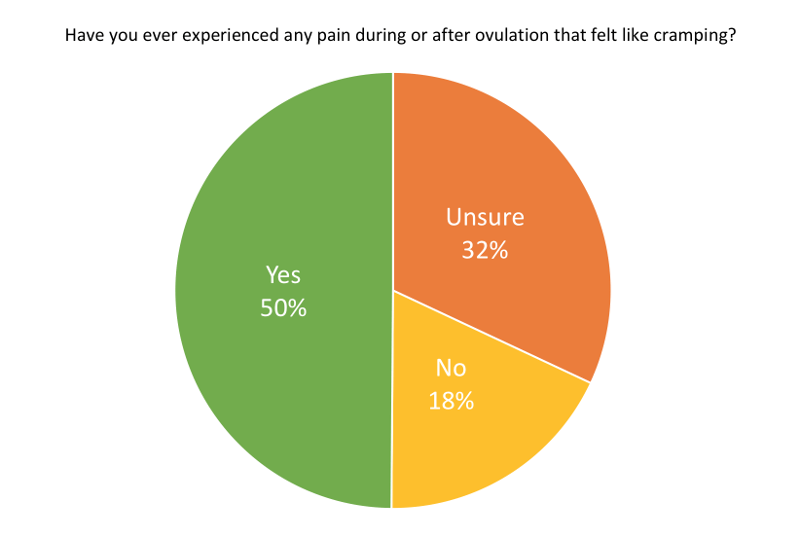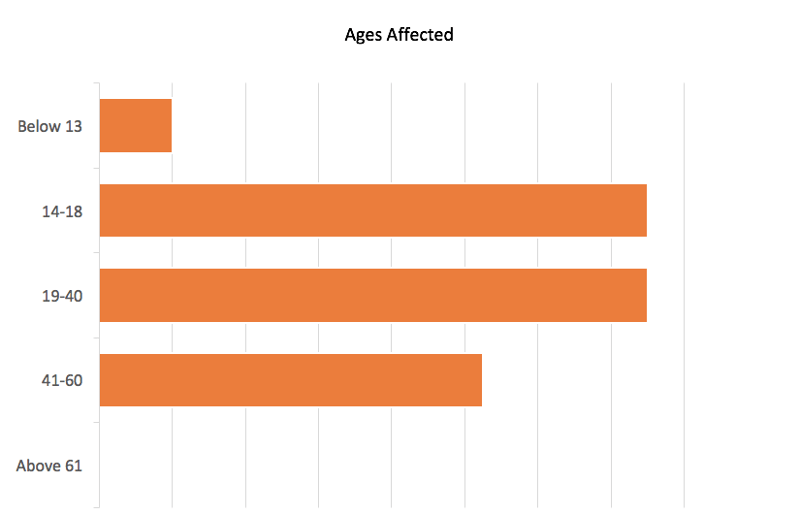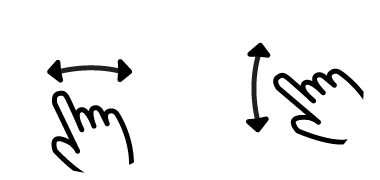Cramping Pain During or After Ovulation? [Here's Why]





Cramping pain around the time of ovulation?
When you are trying to conceive, every ache and pain is put under the microscope.
...could it mean you are pregnant? Is something wrong?
In reality, many of the feelings you have during your cycle are normal and they were probably present before you were trying to conceive - they are just much more noticeable now.
But what about cramping 1 day after ovulation, or even 2, 3, 4, 5, 6, 7 days after ovulation? Is that a normal part of your cycle or an indication of pregnancy? Read on to find out.
Ovulation Calculator asked 9,670 women if they experienced any pain during or after ovulation that felt like cramping and 50% said yes. See the survey results below.
There are over 3 million reported cases of ovulation pain each year in the US... but many more women suffer in silence and don't talk about it!
Ovulation and Mittelschmerz
Cramping pain during ovulation actually affects about 20% of women (one in five). Some women experience very painful ovulation.
Here's what happens...
The follicle (capsule containing the egg) is surrounded by follicular fluid in the ovary. When you ovulate, the egg, fluid and some blood are released from the follicle and ovary.
Causes of ovulation pain
There are a few theories as to what causes this pain;
- Irritation caused by blood and fluid when the egg is released. The blood and fluid can irritate tissues in the abdominal lining.
- Bruising is caused during ovulation when the ovarian wall ruptures.
- Fallopian tube muscle contractions cause discomfort. The contractions gently move the egg towards the uterus.
The following images will help you understand these three causes.
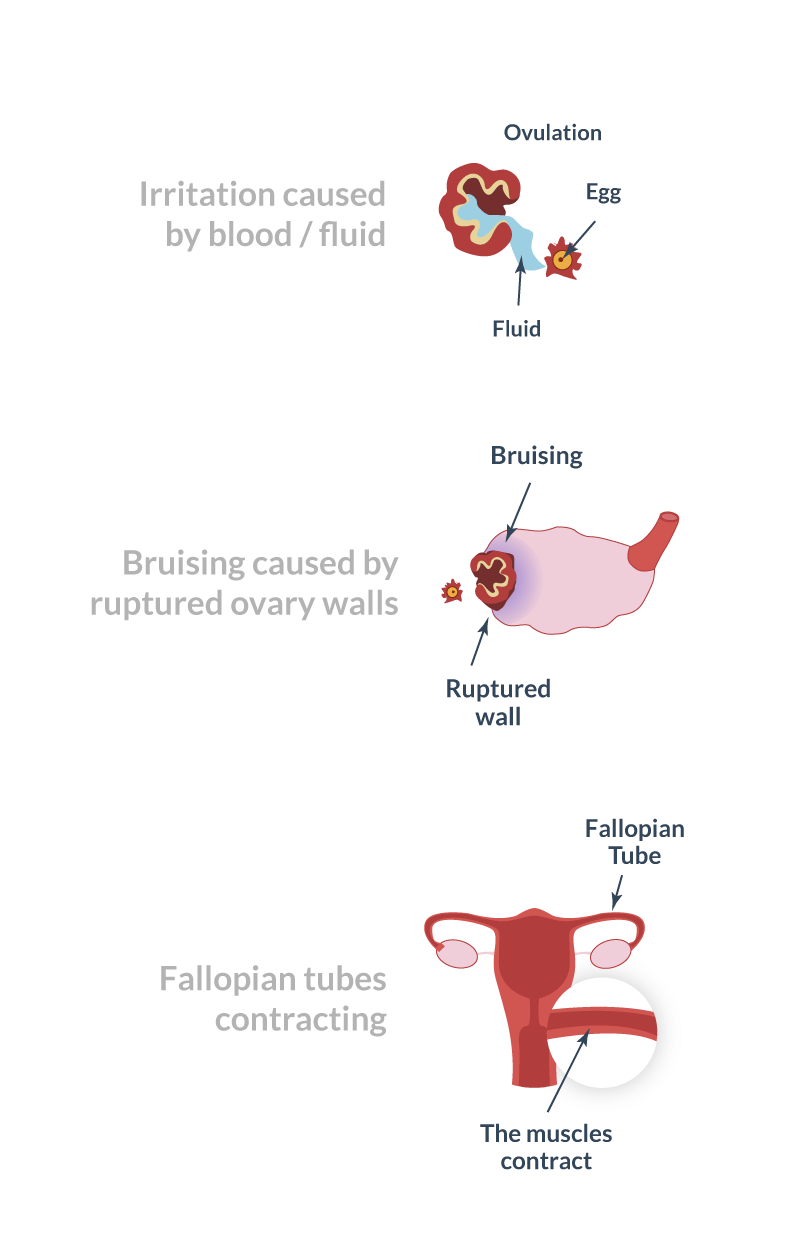
The pain is referred to as Mittelschmerz, which comes from the German words for "middle" and "pain." As this phenomenon describes a pain that occurs in the middle of the cycle, the name makes perfect sense. Contrary to popular belief, the presence of mittelschmerz in a cycle does not indicate pregnancy. It simply indicates ovulation.
However, there is one important distinction. Mittelschmerz occurs during ovulation. This is normally about 15 days before your next period, depending on your cycle and luteal phase length. If you are tracking your cycle closely, have never experienced pain or cramping during ovulation, and are certain that your cramping occurred after ovulation, it may be an indication that you are pregnant (more on this below).
Mittelschmerz affects 1 in 5 women and is most common between the age of 14 and 40.
Ovulation pain symptoms
A pain on one side of your lower abdomen and pelvic area that occurs about 15 days before your next period is due.
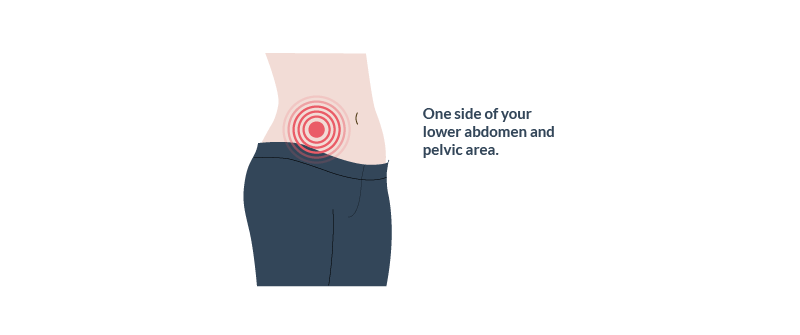
The pain can be described as a sharp and sudden abdominal pain or a dull and cramping like pain. In some cases the pain can be severe, but it is usually mild. Most women experience the pain for a short period of time (a few minutes to a few hours), but for some women the pain can last days (two to three days).
Scientists, researchers and doctors cannot explain why some women experience this pain and others don't. It could simply boil down to genetics.
The pain can be agonizing for some women and can be confused for appendicitis. This pain will only stop occurring at menopause, or during pregnancy.
Treatment
Ovulation pain treatment is not normally needed as the pain is not harmful. However, for severe cases of ovulation pain, it's recommended women take pain relievers that you can get over-the-counter.
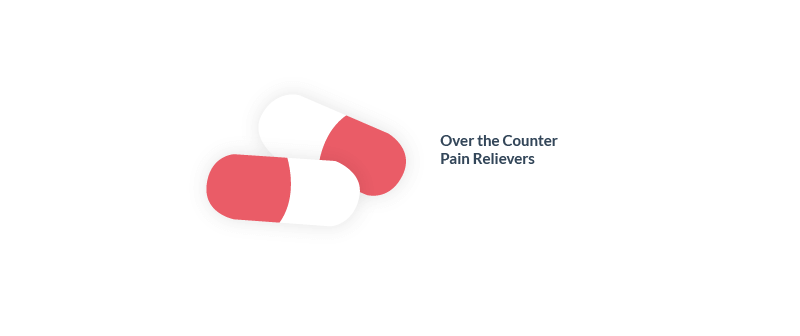
Cramping pain AFTER ovulation
Most women ovulate about 14 to 16 days before the start of their period. If you are closely monitoring your cycle and the signs of ovulation, you should know when you are ovulating.
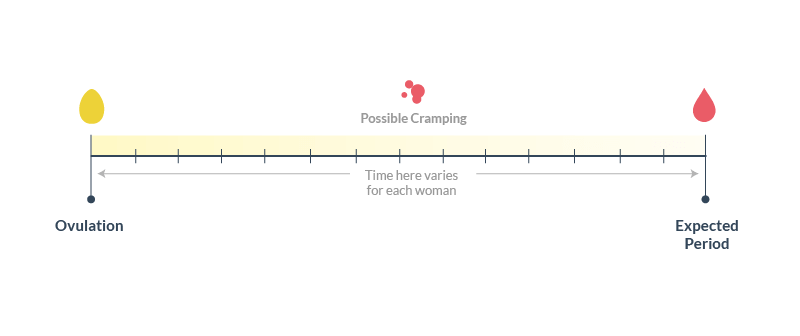
If you experience cramping after ovulation, it is possible that you are feeling the effects of implantation. About 20% of pregnant women report that they feel cramping after ovulation. This is a very positive sign that you may be pregnant, but please understand that not all women experience cramping at implantation. So if you do not feel cramps after ovulation, you could still be pregnant. Take the Implantation Bleeding or Period Quiz.
Other causes of cramping after ovulation
Pregnancy is the most common reason why women experience cramps after ovulating, but that uncomfortable feeling could be due to other things. A menstrual period causes cramps in most women, and although you are not likely to get your period so close to ovulation, it is possible. If you are cramping from your period, though, you should see normal period symptoms follow soon after the uncomfortable feeling sets in.
Endometriosis is another possible yet uncommon cause of cramping that could occur after ovulation. So, if you are experiencing cramping after ovulation and it is not a pregnancy or your menstrual period, you may want to schedule a visit to your gynecologist.
Endometriosis can be a painful condition that may interfere with your ability to conceive, so it is important to involve your doctor early on if you think this may be a problem.
Other ovulation symptoms
Cramping pain is just one of 12 ovulation signs.


